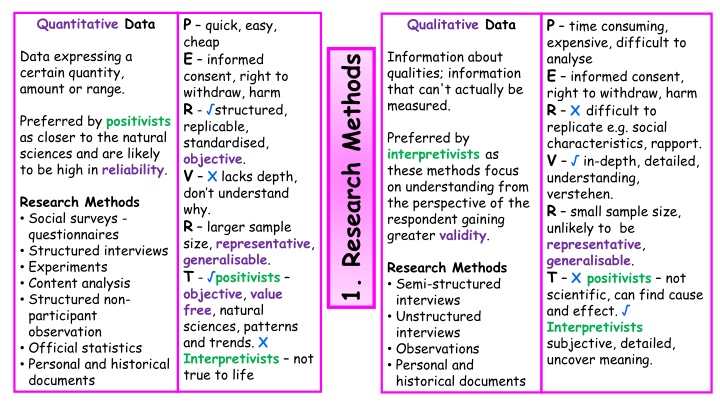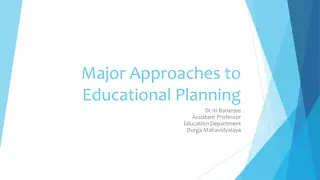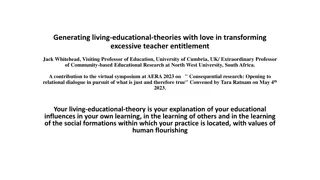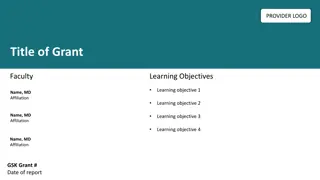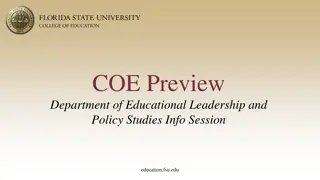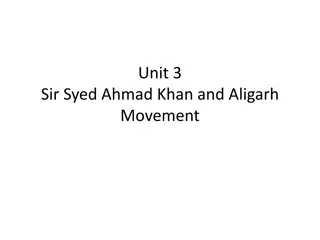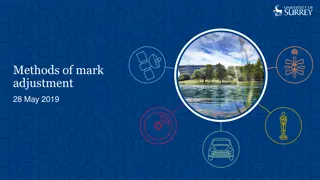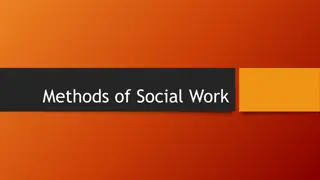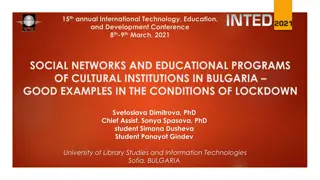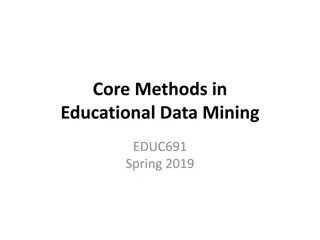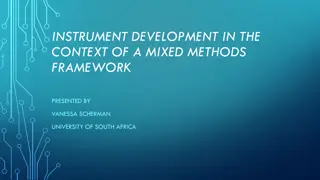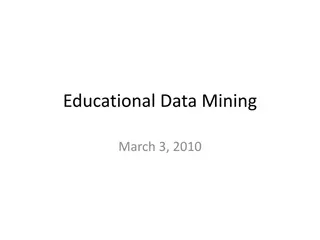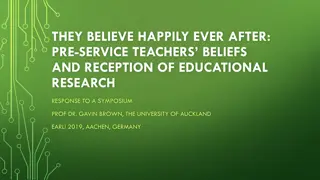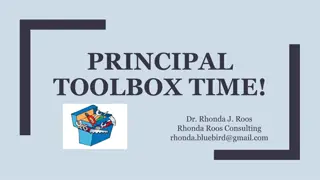Research Methods and Challenges in Educational Research
Research methods in educational research vary between positivist and interpretivist approaches, with a focus on quantitative and qualitative data collection. Issues such as informed consent, right to withdraw, and potential harm must be considered. Challenges in researching teachers, pupils, schools, classrooms, and parents include power dynamics, ethical considerations, and practical constraints. Closed-ended questions are common in educational research to generate statistical data.
Download Presentation

Please find below an Image/Link to download the presentation.
The content on the website is provided AS IS for your information and personal use only. It may not be sold, licensed, or shared on other websites without obtaining consent from the author.If you encounter any issues during the download, it is possible that the publisher has removed the file from their server.
You are allowed to download the files provided on this website for personal or commercial use, subject to the condition that they are used lawfully. All files are the property of their respective owners.
The content on the website is provided AS IS for your information and personal use only. It may not be sold, licensed, or shared on other websites without obtaining consent from the author.
E N D
Presentation Transcript
P quick, easy, cheap E informed consent, right to withdraw, harm R - structured, replicable, standardised, objective. V X lacks depth, don t understand why. R larger sample size, representative, generalisable. T - positivists objective, value free, natural sciences, patterns and trends. X Interpretivists not true to life Quantitative Data P time consuming, expensive, difficult to analyse E informed consent, right to withdraw, harm R X difficult to replicate e.g. social characteristics, rapport. V in-depth, detailed, understanding, verstehen. R small sample size, unlikely to be representative, generalisable. T X positivists not scientific, can find cause and effect. Interpretivists subjective, detailed, uncover meaning. Qualitative Data Data expressing a certain quantity, amount or range. Information about qualities; information that can't actually be measured. 1. Research Methods Preferred by positivists as closer to the natural sciences and are likely to be high in reliability. Preferred by interpretivists as these methods focus on understanding from the perspective of the respondent gaining greater validity. Research Methods Social surveys - questionnaires Structured interviews Experiments Content analysis Structured non- participant observation Official statistics Personal and historical documents Research Methods Semi-structured interviews Unstructured interviews Observations Personal and historical documents
Researching Teacher Researching Pupils Power & status may find it difficult to share views openly with adults. To overcome this you could do group interviews rather than 1-1 interviews. Ability literacy issues with completing questionnaires. Need to carefully word questions. May be difficult to gain informed consent due to lack of understanding of words. Vulnerability and ethics more vulnerable to physical and emotional harm. Need consent from parents, teachers and the pupil are they mature enough to make an informed choice? Child protection issues personal data. Stress are interviews too long form them? BSA have specific guidelines to protect the rights of children. Practical issues more important to gain rapport and trust, could be made easier by matching gender and ethnicity to achieve this. Power relationships are not equal teachers have more power and legal responsibilities. Classroom teachers see this as their territory researcher may be seen as a trespasser. Head teachers, governors, parents and pupils all constrain what teachers can say or do. Teachers can put on a show they are used to be inspected, watched and scrutinised. They are overworked and may be uncooperative interviews and questionnaires may have to be kept short. Researching Schools Formal organisations rules and hierarchies adults may be seen as the enemy. Meighan found that head teachers sometimes view research negatively restrict access, time space etc. Legal framework secondary data attendance data, behaviour, achievement etc. Beynon & Atkinson gatekeepers often steer research away from sensitive areas e.g. poor teachers. Researching Classrooms A controlled setting has boundaries, restrictions on access and behaviour will affect pupils as they are highly controlled in this space. Interactions teachers are skilled at disguising their real thoughts and opinions they can do this to the researcher. Pupils in groups more sensitive to peer pressure, the need to conform could affect completing questionnaires as they will need to be supervised. or group interviews. 2. Education as a Research Context Researching Parents Outside of school access, contact, few opportunities to observe e.g. parents helping with homework. Social class, ethnicity, language may be barriers. Middle class may be more willing to return questionnaires than w/c e.g. literacy issues affects representativeness.
Closed ended questions The respondent must choose their answer from a limited range of possible answers like yes, no or don t know or likert scales. Positivist Generally used by positivists due to their ability to generate statistical data that is reliable, representative and generalisable Written questionnaires Respondents are asked to complete and return by post or e-mail. Structured Interviews Either face-to face or by telephone. Open ended questions These allow the respondent to answer freely in their own words. Quantitative Large amounts of statistical data Primary data This data has not been collected before 3. Social Surveys Questionnaires Hypothesis A theory or idea to test Sampling techniques 1. Random people selected by chance 2. Systematic every 5th, 10th or 100th person is chosen. 3. Stratified a sample that reflects societies diversity 4. Quota researchers have a quota (amount) of requirements to fill Pilot study A trial run to test for problems with questions Sample Not all of the population can be studied so researchers select a sample of it to study Operationalising concepts Putting concepts like God or class into categories (pre-set answers) that can be easily analysed
Advantages Disadvantages 1. Quick, cheap and easy to gather. 2. Reliable can be replicated. 3. Can test a hypothesis. 4. Detached and objective way of collecting the data. 5. Representative; due to the large amount of data that can be gathered, especially if a good sampling method is used. 6. Fewer ethical issues as questions aren t in depth and people can refuse to answer. 7. No issue of deception as informed consent has been gained. 4. Social surveys - 1. The data is limited and superficial. 2. Postal questions have a low response rate, in some studies it is as low as 40%. 3. Very inflexible as hypothesis cannot be changed or adapted. 4. A lack of validity means Questionnaires don t gives us any real insight into people behaviour. 5. Using closed ended questions constrains people s answers. Questionnaires
Practical issues Ethical issues Reliability and Representativeness Lists of students are accessible to make questionnaires representative as schools legally have to keep records of attainment and attendance. Those more involved in truancy or anti- school subcultures are less likely to respond to questionnaires they may not take it seriously. Quick and cheap. Students are easy to locate e.g. schools!. Gatekeepers (e.g. head teachers) may be unwilling to allow access. Questions more likely to be about less sensitive issues or truancy for example. Literacy levels, English as a second language potential barriers. Post or e-mail questionnaires pose fewer ethical concerns because returning the questionnaire is giving consent.However, talking to under 16 s about education is crucial but parental and teacher consent is needed. 5. Questionnaires to Investigate Education Validity Detachment and objectivity Most large-scale research is developed through consultation with head teachers and governments. Therefore topics and questions will be dictated rather than decided upon. Validity is likely to be low due to respondents lack of memory about events or their exaggeration to seem tough / peer pressure. Questionnaires often impose on respondents what is important rather than discovering something new.
Laboratory Experiments Field Experiments Harvey & Stalin sample of 96 teachers, given pictures of 18 children and asked to rate the children. Controlled variables of age, gender and ethnicity. Teachers labelled pupils based on similar children they had taught. Rosenthal & Jacobson California primary school pupils given IQ. Spurters identified randomly. Teacher expectations was the independent variable. Ethically this harmed children's achievement. investigate education 7. Experiments to Charkin et al 48 uni students each taught a lesson to a 10yr old boy. 1/3 told the boy was highly motivated & intelligent. 1/3 were told he was poorly motivated with a low IQ. 1/3 given no information. The high expectancy group made more eye contact and encouraging body language than the low expectancy group.
Field experiments Advantages: Higher validity than lab experiments. Less artificial as respondents are in their natural setting. Quantitative Hawthorne effect People who know they are being studied change their ordinary behaviour Lab experiments Large amounts of statistical data. Primary Research This data has not been collected before. Advantages: Can test a hypothesis. Can be replicated due to controllable variables. Can study cause and effect relationships. Disadvantages: Due to small scale it isn t representative or generalisable. Low validity due to artificial situation. Lots of ethical issues. Disadvantages: Variables more difficult to control lack of reliability. Low in validity due to Hawthorne effect. Lots of ethical issues. 6. Experiments Narrow focus Ethical issues Usually only examine one specific aspect of teacher expectations. Teacher expectations will not be seen in wider process eg. Labelling and SFP. E.g. Charkin et al looked at body language but not at how it might then affect pupils performance. Field experiments some students will suffer e.g. Rosenthal & Jacobson. Practical issues Quick and cheap. Teacher expectations too many variables e.g. class size, type of school, streaming/setting etc. Impact of government policies, material/cultural deprivation cannot be studied in small-scale lab settings. Artificiality Lab experiments not reflective of real life lowers validity.
Semi-Structured Set themes to cover but has some freedom to explore and probe answers. Interpretivist Structured interview Set questions asked to all respondents. Unstructured interview Interviewers have freedom to ask any questions and probe answers for explanation. Generally used by Interpretivists due to their ability to generate valid data about what people think and feel and how they act. Group interview The discussion of topics with small groups of 10-12 people. Qualitative Small in-depth data giving us a real insight Primary This data has not been collected before Structured interviews Interviews No depth so low in validity. Interviewer bias Interviewer could ask leading questions or use body language to subconsciously influence respondents answers. 8. Lacks flexibility. Risk of interviewer bias. Unstructured interviews (Disad) Costly, lack reliability, Representativeness, & Generalisability. Comparison is difficult. Unstructured interviews (Ad) High validity. Can develop a rapport. Real insights. People feel at ease. Structured interviews (Ad) Easy to quantify. Reliable less risk of interviewer bias. Higher response rate if face to face. Can test a hypothesis. D. Manns
Interpretivist Generally used by Interpretivists due to their ability to generate valid data about what people think and feel and how they act. Non-Participant obs Where the researcher observes without interfering. Participant obs Where the researcher becomes a part of what they observe. Structured A set of criteria in categories that need to be recorded. Unstructured Nothing set just record as much important information as possible. Qualitative Small in-depth data giving us a real insight Primary This data has not been collected before overt observation - the sociologist is open about what they are doing by making their identity and purpose known. 10. Observations Keywords Getting in: gaining access to a group. Going native: no longer being a research and being a part of the group. Getting out: leaving the group without putting yourself in danger. Covert observation - the study is done undercover as the researchers identity and purpose are concealed. Observers role To take a position which will not allow you to disrupt the groups normal behaviour and yet offer a good vantage to make observations. Semi-covert observation Telling one person in a group but no others.
Practical issues Reliability W/c / EAL have lower literacy levels. Recording answers may make respondents feel uncomfortable that their answer may have consequences in school. Safety of children is important e.g. bullying, peer pressure, teacher labelling. Getting access to interviewing young people is difficult e.g. head teachers do not want bad publicity. Teachers contractual issues e.g. whistle blowing The nature of some groups makes it very difficult to replicate and interview. Validity Unstructured interviews allow researcher to decode language and slang. Lengthy interviews allow researchers to build a rapport and trust. The appearance of the interviewer may make respondents feel they are an authority figure. There are hierarchy and status issues when interviewing pupils, teachers and senior leaders. A teacher is more likely to give honest response than a senior leader. 9. Interviews to investigate Education Ethics Respondents may become at ease and give up guilty knowledge of deviance e.g. bullying. This leaves the researcher with the ethical dilemma of whether to break the respondents trust and pass the information onto the school. Representativeness Interviews are time-consuming due to the sensitive nature or communication problems (e.g. terminology) which means they are unlikely to produce large enough samples to be representative.
Flandersstructured observation in classrooms found that 68% was teacher talk, 20% pupil talk and 12% lost in silence or confusion! Eggleston took over three months just to set up his cover role to be able to conduct his observations. Positivism Structured observations could be used by positivists as they create data that is easy to quantify and can be replicated = high in reliability. Hard to replicate as unsystematic. Hammersley had to write his notes on the back of a newspaper because he was observing staffroom conversations covertly. Advantages 11. Observations High Validity as you see people in their natural setting. A real insight into why people do the things they do. The only chance to walk in other persons shoes and get their view of the world. More flexible method A way to gain access to deviant groups Gain verstehen Limitations Time, money and personal cost through stress and danger. Personal involvement can reduce objectivity. Difficult to do with pupils due to likely age differences with the researcher, more likely to go in as a paid employer, then hierarchy and power issues will impact on relationships lowering validity. Very difficult to replicate as its so unpredictable low in reliability. Not possible to generalise due to small sample sizes. Maybe unethical to members of group if deception is used. Researcher may be asked to commit or witness illegal acts. The observer is likely to affect the groups especially if they are aware of them (participant observation) hawthorne effect.
Overt observation Many anti-school subcultures won t allow overt participation or at very least will only let them see what they want them to see. However if access is granted this will allow the researcher to ask all sorts of naive but interesting questions. Practical issues Covert observation maybe the only way to study criminal gangs. Gaining access to groups is going to be difficult. Head teachers can restrict access e.g. incompetent teachers Observations can take a long time without any issues arising. Wright as a black teacher she found that some white teachers were hostile whereas many black students held her in high esteem. Hawthorne Effect is a potential problem 12. Observations to investigate Education Covert observation It reduces the risk of changing people s behaviour, Laud Humphreys found this in his observation of causal sex in public places. The risk of one s cover being blown is very dangerous, along with concerns that you may be asked to engage in dangerous activity in order to fit in. Ethics More ethical dilemmas than any other method due to risk to research, illegal activity and lack of or inability to give consent. Guilty knowledge Delamont every observer sees and hears things that could get pupils into trouble e.g. expelled or even the police. Validity A rare method that reveals real insights into criminal and deviant behaviour. Likely to gain verstehen.
Public documents Personal documents Documents Produced byorganisations like schools and includes things like Ofsted reports, council notes from meetings, published company accounts, and records of parliamentary debates. First person accounts and experiences, these include letters, diaries, photo albums, notes in class etc. Refers to diaries, letters, photographs, newspapers, novels, blogs, Facebook and things from television and radio. Historical documents Interpretivists Preferred by Interpretivists because the data is qualitative and allows them a real insight into peoples meanings and motives 14. A personal or public document created in the past. These documents will allow you the opportunity to see how people experienced the social world. Secondary data John Scott assessing documents Scott says we must consider if documents are authentic (not fakes) and if it is credible (believable). We must find out if the document represents the past fairly and that the meaning of words, ideas and beliefs haven t changed. Content analysis A method for systematically studying content McRobbie did this in her study of girls magazines and aspirations.
Advantages Positivist & Interpretivist Can be used by both groups depending on the type of secondary data used Official statistics Gathered by government on births, deaths, marriages, crime and unemployment Its free and available to all. Statistics gives us large amounts of data SATS, GCSE and A Levels results are published every year look for correlations Done by the government and strict sampling so representative. Reliable 13. Quantitative & Qualitative Depending on the type of data Secondary This data has been gathered or created before Secondary data Disadvantages Official statistics Some statistics are not accurate e.g. some schools record Asian students as EAL when this may not be the case this skews attainment results. Statistics may not meet the needs of the sociologists research. Definitions of terms, specifications (e.g. removal of coursework) change over time. Soft statistics (not every incidence is recorded) education unlikely to be low in validity. Positivist Statistics preferred by Positivists due to large amounts of quantitative data, which is reliable, representative and generalisable
Representativeness At first sight they seem to be representative as they are collected by institutions and government agencies but we know they are only the tip of the iceberg. Official statistics Practically there is always large amounts of statistical data available to researchers on a variety of issues from different agencies. Validity Interpretivists statistics are socially construction e.g. truancy. Schools manipulate attendance, expulsion figures etc. as these can affect funding etc. Reliability Validity Although the same research can be replicated what figures are included and exam changes make it difficult to compare. 15. Secondary data Blogs / diaries / snapchat etc. of pupils maybe be exaggerated but can still offer real insight. Hey found real insight looking at the notes girls passed to each other. Ethics These pose few ethical issues if they are part of public record. Documents Practically there are always large amounts of documents especially the internet (e.g. blogs etc) that are easily accessible, however there is also a lot that is restrictedby schools this could be due to child protection or user groups e.g. Snapchat. Reliability & Representativeness If documents about deviant acts are found they are varied and few and far between making them unreliable and unrepresentative.
Ethical issues Practical issues The British Sociological Association guidelines. Time and money. Informed consent participants should be offered the right to refuse to be researched. Participants identity should be kept confidential Researchers should be aware of the social or psychological harm of research. Special care should be give to research in vulnerable groups like young people. Covert research can take place but must be aware of problems of deception. If you can get research funded they may require a certain type of data. Skills of the Sociologist to build trust and rapport or social skills. Skills of the Sociologist to build trust and rapport or social skills. A research opportunity may come out of the blue leaving no time for Questionnaires. 16. Factors influencing a researchers choice of topic Theoretical issues Validity Getting results that are true to life, qualitative methods are seen to do this the best. Reliability getting results that be replicated, quantitative methods allow for this. Representativeness getting results that reflects all of society, large scale quantitative questionnaires allow researchers to make generalisations. Whether the researcher is a Positivist or Interpretivist
Positivists Interpretivism Main aim: Reliability, Value Free, Objective, Representativeness and Generalisability Main aim: Validity Structuralists: Sees society has a set of institutions which shape our behaviour. Interactionism: Sees society as created by our interactions with other people. Functionalists Marxist Labelling theory: Becker, Gillborn & Youdell Walking in other peoples shoes, subjective, small but quality data looking at how people interact A bird s eye view of society, looking for cause and effect relationships and turning behaviour into numbers Quantitative methods: gathering lots of data that be turned into statistical data Qualitative methods: gathering small but in-depth data Research methods: Questionnaires, structured interviews, experiments and official statistics Research methods: Unstructured interviews, participant observation and personal documents
